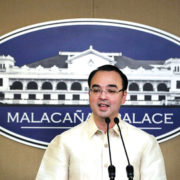Activist from Mindanao detained for 28 hours in US airport
A human rights group has called on Philippine Foreign Affairs Secretary Alan Peter Cayetano on Monday, April 23 to file a diplomatic complaint against the Trump administration after a young Filipino activist was detained in the U.S. for 28 hours last week and sent back to the Philippines.
Jerome Aba, a 25-year-old peace advocate from Mindanao, Philippines, was allegedly subject to “Guantanamo-style torture” after being denied entry to the U.S. at the San Francisco International Airport for what Customs and Border Protection (CBP) officials said was a “technical glitch” with his visa.
Aba had been given a 10-year multiple visa by the U.S. Embassy in Manila.
“Foreign Affairs Secretary Alan Cayetano harps on national sovereignty whenever international actors criticize the Philippine government on its human rights record. If Cayetano meant an ounce of truth in his pronouncements that the country should fully exercise its rights as a sovereign nation, he should uphold the rights of a Filipino citizen who suffered Guantanamo-style torture, among other violations, under the U.S. government,” said Karapatan secretary-general Cristina Palabay in a statement Sunday, April 22.
“We challenge him [Cayetano] to file a diplomatic protest against the Trump administration for the cruel and inhuman acts of the U.S. Department of Homeland Security and U.S. Customs and Border Protection against Filipino Moro human rights activist Jerome Succor Aba,” she added.
Aba had been invited by the U.S. chapter of the International Coalition for Human Rights in the Philippines (ICHRP), and was on route to Washington D.C. to talk with human rights organizations and U.S. congressional offices about the experiences of the Moro and indigenous people under the Duterte-declared martial law in Mindanao last year.
Opening up about his experience, Aba told media reporters that as an advocate, he wasn’t used to being a victim of human rights violations. He also said he was denied access to a lawyer, and was commanded to undress and stand in a cold empty room where an industrial cooling fan was brought in and turned on. He added that he was intimidated with the threat of being shot.
“I was afraid to use the restroom, because they might make a drama that I was trying to escape and they might shoot me,” Aba was quoted saying in an ICHRP-U.S. statement.
He said he remembered an agent saying, “Be good here, be nice here, if you do anything bad, I will not hesitate to shoot you”, saying the agent would reach for his side arm whenever he would move.
An attorney from the National Lawyers Guild (NLG) was at the airport attempting to talk with CBP, according to the statement. Callers from NLG to CBP offices were told they would be called back.
ICHRP said that offices of Congresswoman Nancy Pelosi and Senator Dianne Feinstein also made calls to CBP officials and were told Aba was being detained on a “soft disposition” or “something that could easily be overcome.”
Aba said he further experienced anti-Muslim comments, was interrogated about his beliefs and rally participations, and was accused of being a “terrorist” and “communist.” On two separate occasions, he said he was left in a room with a gun and a grenade which he saw as CBP attempts to “entrap him into using the items.”
CBP spokesman Jamie Ruiz said in a statement that “U.S. Customs and Border Protection does not consider country of origin or human rights activism to be determining factors for admissibility.”
Before being released, Aba said he was coerced to cover up details of his detainment by recording a video statement of him saying he had not been tortured.
A “foot-tall stack of papers that the agents purported were their profile on him” was shredded in front of him before his release, according to the ICHRP-U.S. statement.
To Cayetano, Payaba added, “The filing of a diplomatic protest against the U.S. government will be an indicator if Cayetano and the Philippine government are indeed capable of exercising the country’s sovereignty, or if it is just rhetoric used to conveniently dismiss critics.”







South Asian Muslims are behaviorally different from Middle Eastern Muslims. Notably shy, Muslims who are legitimate Muslims originating from the Philippines have endured situations overseas that are different from Muslims in the Levant.
Despite ISIS infiltration into the Philippines, and NPA (communists) in the Philippines who are known as dangerous there, a simple Muslim male Filipino who has been approved for travel in both countries -The Philipines and the U.S., entering into the U.S., should be treated as a guest from another nation, and not as a criminal. He should file against the security holding him, and the U.S. State Department should be informed about violations of international rights under U.S. and foreign laws pertaining to traveling people from other countries.